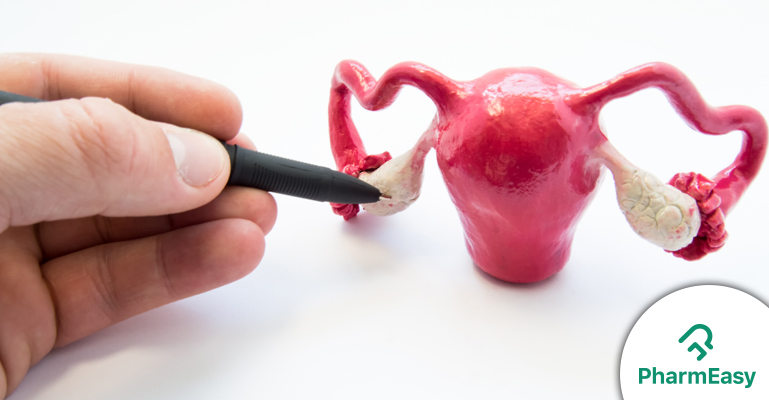What Is PCOD? Know It’s Symptoms, Causes & Treatment
By Dr. Charmi Shah +2 more

Get,

to manage your symptom
Get your,


4 Cr+ families
benefitted

OTP sent to 9988776655



You’ve successfully subscribed to receive
doctor-approved tips on
Whatsapp

Get ready to feel your best.

Hi There,
Download the PharmEasy App now!!


Register to Avail the Offer
Send OTPBy continuing, you agree with our Privacy Policy and Terms and Conditions

Hi There,
Sign up on PharmEasy now!!
Trusted by 4 crore+ families

OTP sent to 9988776655



You have unlocked 25% off on medicines




Code: NU25
By Dr. Charmi Shah +2 more
Table of Contents
PCOD (Polycystic Ovarian Disease), often used interchangeably with PCOS (Polycystic Ovary Syndrome), is a common hormonal disorder affecting women of reproductive age. The hormonal imbalance in the body produces more male hormones than needed which leads to problems in menstruation and fertility along with other issues. Women with PCOD may have irregular or prolonged menstrual cycles, as well as high levels of male hormones.
PCOD results in enlarged ovaries with multiple small follicles and is associated with hormonal imbalance, irregular periods, and difficulty in conceiving.The ovaries may produce a large number of tiny collections of fluid (follicles) and do not release eggs on a regular basis. If left untreated, PCOD can cause more serious problems like heart disease and diabetes1.

In PCOD, many small sacs called follicles fill up with fluid inside the ovaries. Each follicle contains an immature egg that does not mature enough to release the egg by a process called ovulation. The absence of ovulation leads to hormonal imbalance and an excess release of male hormones. Research has not found the exact reason why PCOD occurs as the cause of PCOD is multifactorial and include2:
PCOD signs and symptoms usually appear around the time of puberty, typically noticeable at the time of a girl’s first menstrual period. However, PCOD can also develop later in life, particularly, as a result of significant weight gain. Many women may not realise that they have PCOD, but there are certain common signs and symptoms to look out for, these may include the following2:
Unwanted hair on the face, neck or other body parts is a symptom of hormonal imbalance as seen in PCOD. People often opt for hair removal sessions without consulting a doctor. Instead of just opting for these procedures, consult your gynaecologist or endocrinologist for proper diagnosis and treatment.
Dr. Arpit Verma, MBBS MD (Pharmacology)
PCOD, if untreated, may increase the risk of3,4:
Also Read: 5 Early Signs Of Labour Every Expecting Mother Should Know
PCOD5 is a condition without a cure. You may, however, manage the illness with appropriate treatment and lifestyle changes. Taking a ultrasound or blood tests that assess LH/FSH ratio, anti-müllerian hormone, and androgen levels may help to diagnose PCOD. Treatment usually focuses on symptom control and long-term metabolic health. This may include7,8:
Research9 indicates that women with PCOD are potentially at high risk for CNS and cardiovascular disease. Many of these women have extremely high levels of serum lipoprotein, blood glucose, and cholesterol, which also increase the risk of insulin resistance. Women with PCOD may also have a higher risk for developing endometrial cancer.
Dr. M.G. Kartheeka, MBBS, MD (Pediatrics)
Also Read: IVF (In Vitro Fertilization): What is It, Procedure, Steps, Side Effects & More
If you experience irregular periods, unwanted hair growth, or difficulty conceiving, do not ignore these signs. Consult your gynaecologist or endocrinologist for a comprehensive diagnosis and treatment as it can help prevent complications.
Also Read: Effective Home Remedies For Vaginal Dryness
Disclaimer: The information provided here is for educational/awareness purposes only and is not intended to be a substitute for medical treatment by a healthcare professional and should not be relied upon to diagnose or treat any medical condition. The reader should consult a registered medical practitioner to determine the appropriateness of the information and before consuming any medication. PharmEasy does not provide any guarantee or warranty (express or implied) regarding the accuracy, adequacy, completeness, legality, reliability or usefulness of the information; and disclaims any liability arising thereof.
Comments

Leave your comment...
You may also like
Comments